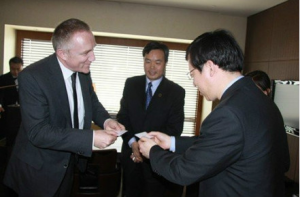Christie’s And PPR Will Benefit From $40 Million Bronzes#

François-Henri Pinault with the new logo for luxury conglomerate PPR, which will be changing its name to Kering. (Forbes)
When Christie’s announced three weeks ago that it had become the first international auction house to receive the Chinese government’s permission to operate independently on the mainland, the news sparked speculation as to how the company had pulled off such a coup -- especially in the face of a seemingly insoluble four-year controversy over a set of looted Qing dynasty bronze zodiac heads that the auction house had put up for sale in 2009. However, speculation was laid to rest this past Friday, when Christie’s owner François-Henri Pinault announced that his family would donate the heads, with an estimated value of $40 million, to China.
The end of this drama marks not only a remarkable turnaround for Christie’s but demonstrates the increasingly long-term vision and commitment that luxury magnates like Pinault hold when it comes to the future of luxury in China.
When considering the fact that the Pinault family owns not only Christie's, but also luxury conglomerate PPR (soon-to-be Kering), which owns major fashion labels such as Bottega Veneta, Gucci, and Alexander McQueen, the impact of this decision is far-reaching. With China now the largest and fastest-growing region for luxury sales, companies cannot afford to cause hard feelings with Chinese officials and consumers. Meanwhile, the family's strengthened ties to the government may prove beneficial in an environment in which luxury is under increasing official scrutiny. It is not only Kering’s luxury companies that will gain from closer government ties, but also the conglomerate’s sportswear labels like Puma, which may see an increase in endorsement deals from Chinese state-sponsored athletes.
For anyone following this story since the aborted 2009 sale, the importance that the Chinese government places on retrieving these heads -- looted by British and other troops during the destruction of the Qing Yuanmingyuan imperial retreat in 1860 -- is hard to overstate. The two recently donated heads, depicting a rat and a rabbit, are part of a 12-piece set that was largely unaccounted-for until two other animal heads appeared at a Sotheby’s auction in 1987. More pieces have turned up over the years, and each time they did, Chinese state-sponsored and independent buyers paid more to acquire them, exponentially driving up their value.

Pinault meets with Chinese government officials to discuss the donation of the zodiac heads. (Luxury Industry Analysis/Weibo)
Significantly, Pinault’s donation marks the first time that a non-Chinese owner of any of the heads has been willing to give, rather than sell, the heads to China. As noted, such generosity has its practical side, pointing up the imperative for smooth relations with not only the government but with Chinese consumers.
Christie’s vision for its business in China began long before the 2009 controversy, as it was the first auction house to open a representative office on the mainland almost 20 years ago. It had operated as part of a joint venture with a Chinese auction house since 2005.
The public relations nightmare that resulted from the 2009 debacle met with a series of continuous escalations in political rhetoric and legal battles over the ownership of the heads. On the auction house’s part, a corresponding charm offensive began in 2010 with the presentation of a state-curated exhibition of Chinese art that many critics at the time saw as a political move.
Christie’s will likely benefit from the donation in many ways. In addition to its probable role in the recent mainland auction permission, in affirming the company’s respect for China, it could change perceptions among the wealthy Chinese collectors who are Christie’s primary mainland client base. The donation also reassures bidders that making high-profile purchases at Christie’s in China and abroad won’t harm their own relations with officials.
From this most recent high-profile donation to Apple’s recent public apology to Hollywood’s numerous recent efforts to appease Chinese censors, companies are increasingly and rapidly aligning themselves to comply with the specific government demands that ensure access to Chinese consumers’ growing pocketbooks.
It is yet to be seen, though, if the transfer of the rat and rabbit heads to China will actually win over the Chinese public in the way Pinault intends. "This is a sign of friendship towards the Chinese people and will benefit the effort to bring back other lost Chinese relics from abroad," said CCTV on Friday, but Weibo users appeared more cynical. “It's great that they’ve been returned, but you can’t say something that’s been plundered can be ‘donated,’” remarked one user on a thread about the topic. Along the same lines, another said, “How can this be called a donation when it's a return? Have the courage to return the entire Summer Palace; furthermore, rebuild it!”
